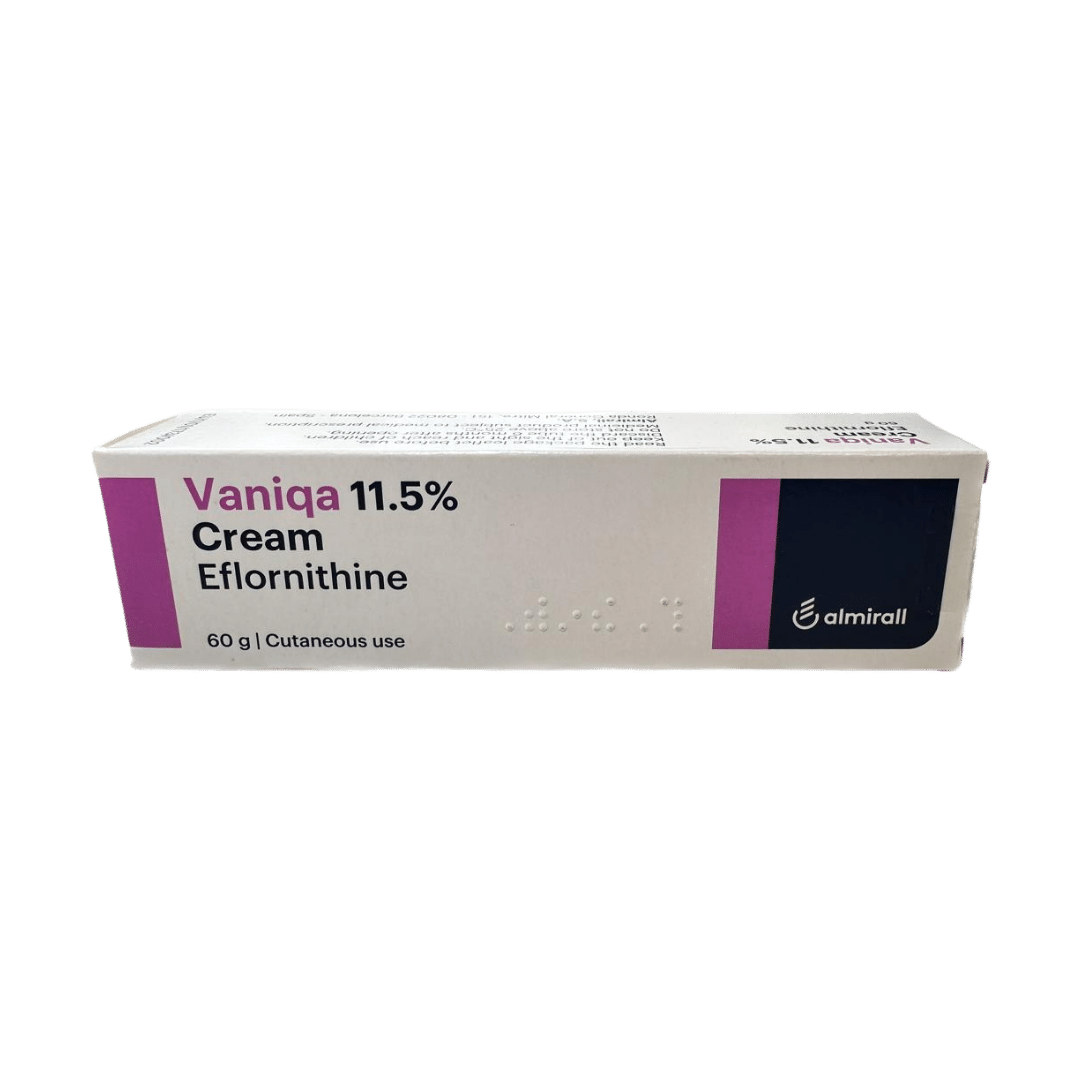Vaniqa Hair Removal Cream

Fastest delivery:
Order by 03:00pm
-

Quick, Discreet & Free Delivery
Swift, discreet, and cost-free delivery! Arrives as quickly as the next working day.
-

100% UK-based pharmacy
Our team of doctors and prescribers, and our support staff, are all UK-based.
-

Free support and advice
We're on hand to offer free support and advice by email and telephone (Mon - Fri 09:00 - 18:00).
-

We’re rated 4.9 out of 5
based on over 170 reviews collected on Google.
Description
Vaniqa contains the active substance eflornithine. Eflornithine slows down the growth of hair through
its effect on a specific enzyme (a protein in the body involved in the production of hair).
Vaniqa is used to reduce the growth of excessive hair on the face of women older than
18 years of age.
Warnings
Do not use Vaniqa if you are allergic to eflornithine or any of the other ingredients of this medicine.
Warnings and precautions:
- Talk to your doctor or pharmacist before using Vaniqa
- tell your doctor of any other medical problems you may be experiencing (especially related to your kidneys or liver).
If you are unsure whether or not to use this medicine, contact your doctor or pharmacist for advice.
Excessive growth of hair may be a result of underlying diseases. Talk to your doctor if you suffer from polycystic ovary syndrome (PCOS) or specific hormone producing tumours, or if you take medicines that can induce hair growth, e.g. cyclosporine (following organ transplants), glucocorticoids (e.g. against rheumatic or allergic diseases), minoxidil (against high blood pressure), phenobarbitone (against seizures), phenytoin (against seizures) or hormone replacement therapy with male hormone.
like effects.
Children and adolescents:
Vaniqa is not recommended for use in anyone younger than 18 years of age.
Directions
Always use this medicine exactly as your doctor has told you. Check with your doctor or pharmacist if
you are not sure.
- Use twice a day, at least 8 hours apart.
- If you experience irritation (e.g. stinging burning), reduce the use of Vaniqa to once daily until the irritation has gone. If it persists contact your doctor.
- If you have just shaved or used any other hair removal method, wait at least 5 minutes before using Vaniqa. It may sting or burn if you put this cream on cut or irritated skin.
- Clean and dry the areas of the skin where you will be using the cream.
- Apply a thin layer of cream and rub it in thoroughly until no visual residual product remains on the treated areas.
- If possible, do not wash these areas of skin for 4 hours after applying the cream
- Wash your hands after applying the cream.
- Wait at least 5 minutes before using make-up or sunscreen on the same areas.
- When using on the face, avoid contact with your eyes or the inside of your nose or mouth. If you should accidentally get Vaniqa into your eyes, mouth or nose, rinse well with water.
Vaniqa is not a depilatory cream, so you may need to continue with your hair removal method, for example by shaving or plucking.
It may take 8 weeks before you see results. It is important to continue using the cream. If you do not see any improvement after using it for 4 months contact your doctor. If you stop using it your original hair growth may return within 8 weeks.
Ingredients
The active substance is eflornithine.
Each gram of cream contains 115 mg of eflornithine (as hydrochloride monohydrate).
The other ingredients are:
cetostearyl alcohol; macrogol cetostearyl ether; dimeticone; glyceryl stearate; macrogol stearate; methyl parahydroxybenzoate (E218); liquid paraffin; phenoxyethanol; propyl parahydroxybenzoate (E216); purified water and stearyl alcohol. Tiny amounts of sodium hydroxide (E524) are sometimes added to keep acidity levels (pH levels) normal.
Side Effects
Very common (affects more than 1 user in 10):
- acne
Common (affects 1 to 10 users in 100):
- dry skin
- hair loss
- inflammation around the hair shaft
- itching
- rash
- redness
- skin irritation and bumps caused by shaving
- skin irritation
- stinging, tingling or burning feeling on the skin
Uncommon (affects 1 to 10 users in 1,000)
- bumpy rash (papular rash)
- cold sores
- redness and irritation at the site where the cream is applied
- eczema
- inflammed, dry, cracked or numb lips
- ingrowing hairs
- pale areas on the skin
- skin bleeding
- skin boils
- skin flushing
- skin inflammation
- sore skin
- swelling of the mouth or face
- unusual hair texture or hair growth
Rare (affects 1 to 10 users in 10,000):
- abnormal skin growth (skin neoplasm)
- excessive hair growth
- flushing, facial redness and pimples possibly with pus
- other skin disorders
- red, scaly and itchy skin inflammation (seborrhoeic dermatitis)
- red, bumpy or blistering rash
- skin cysts
- skin tightness

